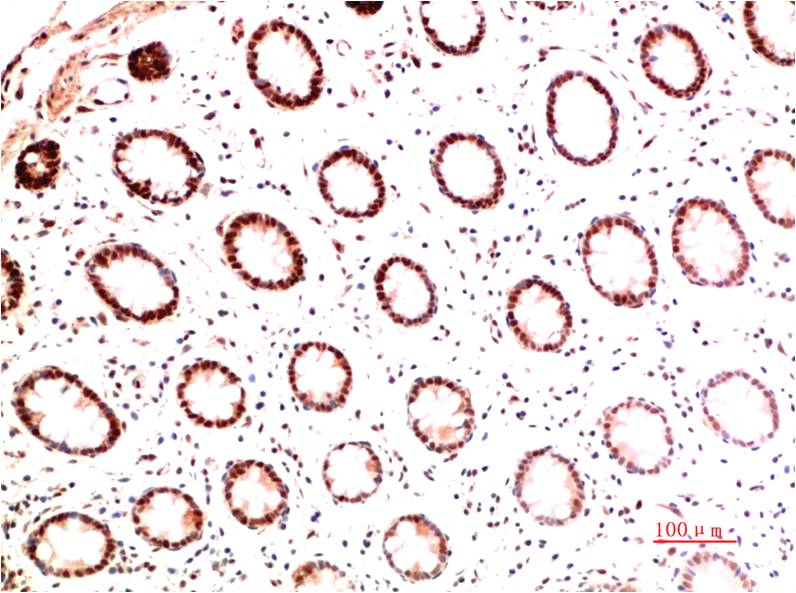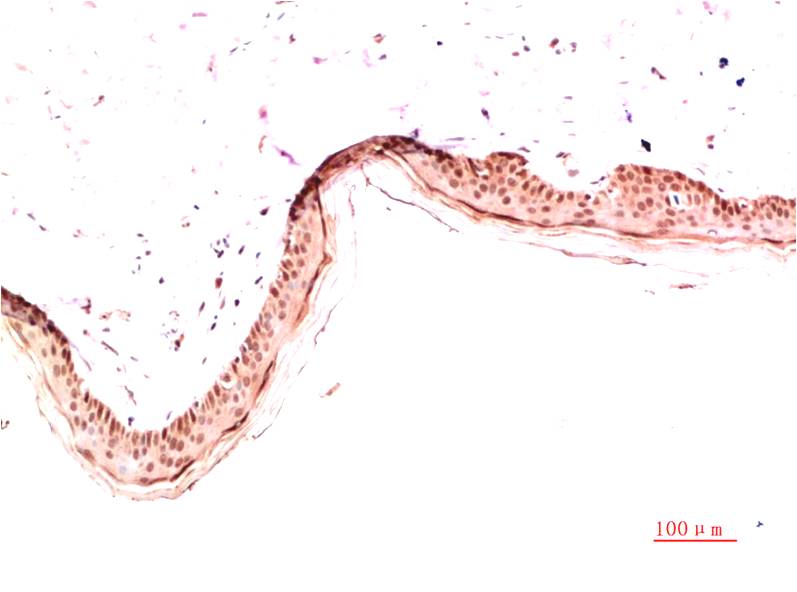

| WB | 咨询技术 | Human,Mouse,Rat |
| IF | 咨询技术 | Human,Mouse,Rat |
| IHC | 1/100-1/200 | Human,Mouse,Rat |
| ICC | 技术咨询 | Human,Mouse,Rat |
| FCM | 咨询技术 | Human,Mouse,Rat |
| Elisa | 咨询技术 | Human,Mouse,Rat |
| Aliases | OI1; OI2; OI3; OI4; EDSC; CAFYD; EDSARTH1; COL1A1; Collagen I |
| Entrez GeneID | 1277 |
| clone | 4C4 |
| WB Predicted band size | 139 kDa |
| Host/Isotype | Mouse IgG1 |
| Antibody Type | Primary antibody |
| Storage | Store at 4°C short term. Aliquot and store at -20°C long term. Avoid freeze/thaw cycles. |
| Species Reactivity | Human,Mouse,Rat |
| Formulation | Purified antibody in PBS with 0.03% Proclin 300,0.5%BSA and 50% glycerol. |
+ +
以下是关于COL1A1抗体的3篇假设性参考文献示例(非真实文献,仅供格式参考):
1. **文献名称**:*COL1A1 Antibody-Based Detection of Fibrosis in Liver Disease Models*
**作者**:Smith A, et al.
**摘要**:研究开发了一种高特异性COL1A1单克隆抗体,用于检测肝纤维化小鼠模型中I型胶原的异常沉积,证实其可作为纤维化程度的生物标志物。
2. **文献名称**:*Role of COL1A1 Autoantibodies in Osteogenesis Imperfecta Pathogenesis*
**作者**:Chen L, et al.
**摘要**:探讨COL1A1自身抗体在成骨不全症患者血清中的存在及其对胶原蛋白组装的影响,提示其可能参与疾病进展机制。
3. **文献名称**:*COL1A1 Antibody Targeting Inhibits Tumor Invasion in Triple-Negative Breast Cancer*
**作者**:Wang Y, et al.
**摘要**:利用COL1A1抗体阻断肿瘤微环境中I型胶原的信号传导,显著抑制三阴性乳腺癌细胞的迁移和侵袭能力。
(注:以上为模拟文献,实际引用时请通过PubMed、Web of Science等平台检索真实发表的研究。)
The COL1A1 antibody is a key reagent used to detect collagen type I alpha 1 chain (COL1A1), a major component of type I collagen, the most abundant structural protein in the extracellular matrix. Encoded by the COL1A1 gene, this protein forms a triple helix with two COL1A2 chains, providing tensile strength to tissues such as skin, bone, tendons, and organs. COL1A1 antibodies are widely employed in research to study collagen synthesis, tissue remodeling, and fibrosis. They are critical in identifying abnormalities in collagen production linked to genetic disorders like osteogenesis imperfecta (brittle bone disease) or Ehlers-Danlos syndrome, as well as pathological conditions including fibrosis, cancer metastasis, and chronic wound healing.
These antibodies are typically developed in hosts like rabbits or mice using immunogenic peptides derived from specific COL1A1 epitopes. Commercial COL1A1 antibodies vary in clonality (monoclonal/polyclonal) and applications, including Western blotting, immunohistochemistry (IHC), immunofluorescence (IF), and ELISA. Validation ensures specificity for the target protein, often via knockout controls or peptide blocking assays. In translational research, COL1A1 expression is monitored to assess fibrotic progression in organs like the liver, lung, or heart. Additionally, they aid in studying bone development, tumor stroma interactions, and therapeutic responses in preclinical models. Proper antibody selection depends on experimental needs, species reactivity, and compatibility with detection systems.
×